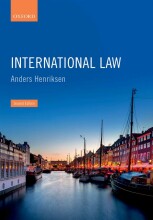Summary: International Law
- This + 400k other summaries
- A unique study and practice tool
- Never study anything twice again
- Get the grades you hope for
- 100% sure, 100% understanding
Read the summary and the most important questions on International Law
-
Week 1: Nature of international law
This is a preview. There are 2 more flashcards available for chapter 07/03/2019
Show more cards here -
Who is often considered as the Grandfather of modern international law, what is wrong with this and who is also important?
Hugo de Groot was considered the Grandfather. This is a Eurocentric view and Shaybani did what Grotius did about 800 years earlier.This is called the Third World Approach to International Law. -
What did the Peace of Westphalia (1648) established in European Public Law?
The system of 'states' emerge. There is a shift from sovereignty (individual) to a territorial unit. Sovereignty is no longer in the individual (The Prince) but in an entity: the State. Sovereignty means that you are on top of the food chain. -
There is something called 'the myth of the social contract', which Max Weber gives as a definition of a State.
We give up some of our liberty to security. This is what Max Weber goves as the definition of a State: a State is a monopoly of a legitimate use of violence. -
What is the fundamentally different way in how international law works in comparison to domestic law?
Domestic law is based on coercion, and international law is based on consent. In international law there is a lack of a leviathan. -
What is the nature of international law and what is the reason that this does work at an international level compared to the domestic level?
Anarchy. There is a lack of order. Chaos.
At a domestic level anarchy would mean the devastation of the State, but States are governed by a anarchical system. You need to find a system that works for all states, that are each on the top of their food chain. -
What are the 3 foundation stones of international law and on which two pillars is this build?
- Subjects of international law
- Sources of international law
- State responsibility
- Limitations on the use of force
- Peaceful settlement of disputes
-
Week 2: Sovereignty and the State
This is a preview. There are 7 more flashcards available for chapter 14/03/2019
Show more cards here -
What is the primary subject of international law and which other subjects gain standing through this filter?
The State
- Inter-Governmental organizations
-The individual
- Multinational corporations -
What is the reason that sovereign states will impose limits on itself? Explain this with the example of human rights.
The essence is in mutual gain. The State consents.
Human rights are a means by which a State can protect itself from itself. An individual will not be willing to give up their rights to the State if that State is mistreating the individual. -
Through which two principles emerges the communal thread of international law?
- Jus cogens: a norm for which there can never be a justification for its breach.
- Obligations erga omnes:
The international community has legal interests beyond those of any State. -
What is the weakness of international law?
Every State for itself. There is no space for the common good. International law is good in addressing States but not in addressing common goods or problems.
- Higher grades + faster learning
- Never study anything twice
- 100% sure, 100% understanding






























